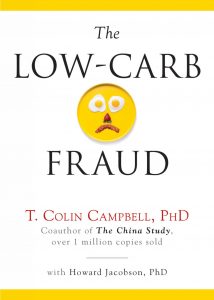
A thought experiment: you walk into a restaurant near the Stanford University campus, and you want to encourage the patrons waiting on line to order a meatless option for lunch? You can tell them one fact. What would it be, and how would you say it?
Take your time; I'll wait.
[Jeopardy theme plays]
To save us some time, I'll give you two options. Which one will work better?
Option A: “Some people limit how much meat they eat. This is true both nationally and here at Stanford. Specifically, recent research has shown that 30% of Americans make an effort to limit their meat consumption. That means that 3 in 10 people eat less meat than they otherwise would.”
Option B: “Some people limit how much meat they eat. This is true both nationally and here at Stanford. Specifically, recent research has shown that 30% of Americans have started to make an effort to limit their meat consumption. That means that 3 in 10 people have changed their behavior and have begun to eat less meat than they otherwise would.”
What do you think? Option A or Option B?
If you're like me, and the dozen or so people I've informally asked, you chose Option B. It just seems much friendlier and, well, more convincing. But why?
Meet Gregg Sparkman
Today's guest, Gregg Sparkmann, PhD, ran this experiment to test the idea of dynamic norms. That is, the concept that what's considered normal and acceptable can change.
Sparkmann and his mentor, Greg Walton (last week's podcast guest), hypothesized that because change is hard, the knowledge that people are changing might indicate to a person that there was a good reason for it.
Also, they sensed that one of the things that stops people from changing and adopting new habits, behaviors, and ideas is defensiveness at being late to the party. That is, if I go plant-based and you don't, you can just dismiss me as a weirdo. But if I go plant-based first, and you follow, then my status has to go up relative to yours because I got there first. So you'd rather dig in your heels and convince yourself that going plant-based is just stupid.
So when people are told that 30% of the population is already doing something virtuous or smart, they bristle. They resist. They shut down.
By contrast, when people are told that 30% of the population is just starting to do something, they get intrigued. If it's just starting, then they can get in on the ground floor. They can be an early adopter, a maven (to borrow a Malcolm Gladwell term that he borrowed from my grandmother), a key influencer. Plus, the fact that people are changing suggests good reason to join them.
In Sparkmann's restaurant study, 17% of the participants who were told Option A chose a meatless lunch. And of those who were given Option B, 34% went meatless. Basically, adding the phrase “have started to” doubled the effectiveness of the message in changing behavior.
I'm delighted to share this conversation with Gregg Sparkman with you. In it, we covered:
- the power of norms to dictate behavior
- the meat-eating norm: a salient default
- dynamic vs static norms
- why we resist going second
- bandwagon effects
- Robert Cialdini's hotel towel studies
- “change isn't easy, so there must be a reason”
- social proof that change must not be that hard
- overcoming cognitive biases
- eroding strict identity categories
- “do-gooder” derogation and anger at vegetarians
- dynamic norms assure you that your current behavior isn't your fault
- “behaviors are a product of cultural momentum”
- positive and possible nefarious uses of dynamic norms
- Tyson Foods' public acknowledgment of the meatless future
- and much more…
Enjoy, add your voice to the conversation via the comment box below, and please share – that's how we spread our message and spread our roots.
Links
Research Paper: “Dynamic Norms Promote Sustainable Behavior, Even if It Is Counternormative,” by Gregg Sparkman and Gregory M. Walton
Gregg Sparkman's Stanford profile page
Support the Podcast
Like what you hear? You can contribute to the growth and improvement of the podcast by becoming a patron. Click the “Support on Patreon” or “Donate” buttons on the right to help out.
Ready to embark on your Big Change journey?
Are you tired of knowing what to do, and still not doing it consistently? The Big Change Program, led by Josh LaJaunie and myself, will help you take the steps to finally live according to your knowledge and values.
Join the Plant Yourself mailing list (top right of this page) to learn more, and to get notified about the next Bobsled Run of the program.
Ask your questions or share your feedback
Comment on the show notes for this episode (below)
Connect with me
Subscribe, rate, and review in iTunes
Join the Plant Yourself Facebook Page
Music
 The Plant Yourself Podcast theme music, “Dance of Peace (Sabali Don),” is generously provided by Will Ridenour, a kora player from North Carolina who has trained with top Senegalese musicians.
The Plant Yourself Podcast theme music, “Dance of Peace (Sabali Don),” is generously provided by Will Ridenour, a kora player from North Carolina who has trained with top Senegalese musicians.
It can be found on his first CD, titled Will Ridenour.
You can learn about Will, listen to more tracks, and buy music on his website, WillRidenour.com.
Gratitudes
Thanks to Plant Yourself podcast patrons
– Kim Harrison
– Lynn McLellan
– Anthony Dissen
– Brittany Porter
– Dominic Marro
– Barbara Whitney
– Tammy Black
– Amy Good
– Amanda Hatherly
– Mary Jane Wheeler
– Ellen Kennelly
– Melissa Cobb
– Rachel Behrens
– Christine Nielsen
– Tina Scharf
– Tina Ahern
– Jen Vilkinofsky
– David Byczek
– Michele X
– Elspeth Feldman
– Viktoriya Dolomanova
– Leah Stolar
– Allan Kristensen
– Colleen Peck
– Michele Landry
– Jozina
– Julianne Rowland
– Stu Dolnick
– Sara Durkacs
– Kelly Cameron
– Wayne Pedersen
– Leanne Peterson
– Janet Selby
– Claire Adams
– Tom Fronczak
– Jeannette Benham
– Gila Lacerte
– David Donohue
– Blair Seibert
– Doron Avizov
– Gio and Carolyn Argentati
– Jodi Friesner
– RuthAnn Funderburk
– Mischa Rosen
– Michael Worobiec
– Alicia Lemus
– Val Linnemann
– Nick Harper
– Stephanie Halmes
– Bandana Chawla
– Martha Bergner
– Nikole Ramsay
– Susan Ahmad
– Molly Levine
– The Inscrutable Harry R
– Susan Laverty the Panda Vegan
– Craig Covic
– Adam Scharf
– Karen Bury
– Heather Morgan
– Ashley Corcoran
– Kelly Michiya
– DeAnne Norton
– Bonnie Lynch of Plant Happy Oregon
– Sabine Kurtzhals
– Nigel Davies
– Marian Blum
– Teresa Kopel
– Shell Routledge
– Julian Watkins
– Brid O'Connell
– Brian Sheridan
– Shannon Herschman
– Cate Rolls
– Linda Ayotte
– Julie Lang
– Holm Hedegaard
– Isa Tousignant
– Connie Haneline
– Erin Greer
– Alicia Davis
– AvIvA Lael
– Heather O'Connor
– Carollynne Jensen
– Sheri Orlekoski of Plant Powered for Health
– Karen Smith
– Scott Mirani
– Karen and Joe Crabtree
– Tanya Lewis
– Kirby Burton
– Theresa Carrell
– Kevin Macaulay
– Elizabeth Rothschild
– Kelly Baker Miracle
– Ann Jesse
– Sheryl Dwyer
– Jenny Hazelton
– Valerie Pelletier
– Peter W Evans
– Colleen Harrison
– Justine Divett
– Joshua Sommermeyer
for your generous support of the podcast.
Disclosure
This post may contain amazon affiliate links. I may receive amazon gift certificates from your actions on such links.

 Listen to Josh LaJaunie and me narrate
Listen to Josh LaJaunie and me narrate 



